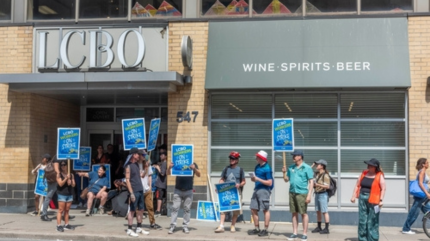
Workers at the Liquor Control Board of Ontario (LCBO) have voted to accept a deal on pay and other issues, bringing two weeks of strike action to a close.
The agreement sees staff at the state-run retailer and wholesaler receive an 8% pay increase over three years.
Additionally, amid Ontario’s plans to ease restrictions on the sale of alcohol, no LCBO stores are to close and there will be a “cap” on the number of agency stores.
LCBO will hire 60 permanent and part-time employees for its warehousing, while also converting 12.5% jobs – amounting to roughly 1,000 workers – from casual positions to permanent or part-time roles.
Staff who are casual or part-time and work more than 1,300 hours will have “improved” access to benefits.
LCBO said it is “pleased” that the agreement has been backed by workers. The deal is awaiting its full ratification by the government. Following the end of the strike, the retailer and wholesaler said it expects to have its stores reopened by Tuesday (23 July).
“We again thank the negotiating teams … for their work in reaching an agreement that is fair for our unionised employees and helps the LCBO operate efficiently and effectively for Ontarians in a changing marketplace.”
Roughly LCBO 10,000 workers took part in the strike action, represented by Ontario Public Service Employees Union (OPSEU).
Unusually, the strike was not solely centred on worker benefits and pay. Workers called for investment in LCBO so it would be better equipped to compete with other stores as the regulations on where alcohol could be sold in Ontario are eased.
The Ontario government and its Premier Doug Ford have plans to expand the alcohol beverage market in the province to increase “choice and convenience for shoppers”.
By the end of October, every convenience, grocery and big-box store in Ontario will be able to sell beer, cider, wine and ready-to-drink alcoholic beverages if they choose to do so.
LCBO has agreed to limit its ‘Convenience Outlets’ programme to 400 stores. These outlets allow independent local retailers to sell alcohol in areas where consumers have no easy access to LCBO shops.
It will also limit the contracting out of its warehousing operations and has pledged to increase the volume of products at warehouses serving its retail outlets by 1.25 million cases.
“We went on strike to protect good jobs and public revenues, and to win more permanent jobs with benefits and guaranteed hours,” OPSEU bargaining team chair Colleen MacLeod said.
“Our members stood strong. They held strong lines, they talked to their communities and they won.”
LCBO has 669 retail stores in the province of Ontario. The company is also the wholesale supplier for on-trade and hospitality venues. Its operations were impacted during the strike. LCBO initially said it would aim to open 32 stores three days a week if the action was prolonged. However, the monopoly said last week it would be closing all of its retail stores to support its on-trade customers.
At the start of the strike, LCBO instructed shipping companies to pause activities including carrier partner pickups to “help reduce congestion” in its warehouses and supply chain.
Canada has 13 authorities across its ten provinces and three territories tasked with regulating alcohol sales and distribution, of which LCBO is one.



